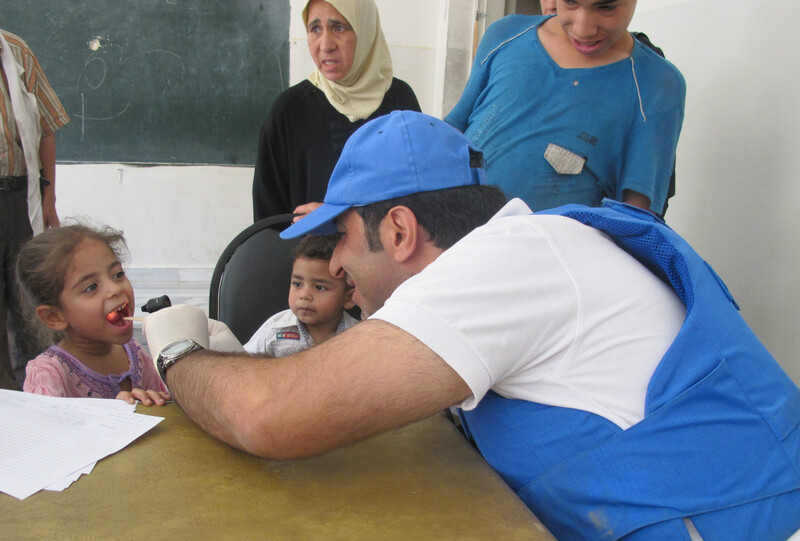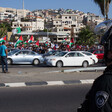Rights and Accountability 21 August 2015

An UNRWA worker treats civilians from Yarmouk, where cases of typhoid have more than tripled in three days. (UNRWA)
The number of confirmed typhoid cases has “more than tripled” since Tuesday among Palestinians from the Yarmouk refugee camp in Syria, according to UNRWA, the UN agency for Palestine refugees.
Gaining its first access to Yalda, a neighboring area where many Palestinians have sought refuge since early June, UNRWA has now confirmed at least 23 cases of typhoid. Worse still, this comes at a time when Damascus is enduring an intense heatwave.
Located on the southern outskirts of Damascus, Yarmouk is one of 13 Palestinian refugee camps in Syria and was once home to some 200,000 people. Due to a brutal Syrian regime-imposed siege that limits residents’ access to food and medicine, that number had sunk to an estimated 18,000 by March.
Ostensibly in cooperation with Jabhat al-Nusra, the Syrian branch of al-Qaeda, Islamic State (ISIS) invaded Yarmouk in April and occupied more than 90 percent of the camp.
Since that onslaught, the number of civilians left in the camp is estimated to be between 5,000 and 8,000, according to the Yarmouk-based Jafra Foundation for Relief and Youth Development.
“Fight against time”
“As a [heatwave] continues to affect Damascus, with temperatures topping 41°C (105°F), and with frequent cuts in water supplies, the risk of epidemics is extremely worrying in Yarmouk, Yalda and other adjacent areas such as Babila and Beit Saham,” UNRWA spokesperson Chris Gunness told The Electronic Intifada.
“Access to healthcare in these places remains heavily limited,” Gunness said, adding that the UN has not been able to access the camp’s interior since 28 March — before the ISIS invasion.
“The vulnerability of civilians in Yarmouk remains of the highest severity. UNRWA is deeply concerned that without access, the most basic humanitarian needs of Palestinian and Syrian civilians, including many children, will be left unmet,” Gunness continued.
“This is a fight against time. We are concerned that unless we see a rapid improvement in the public health situation, the number of typhoid patients could increase to the level of a public health emergency.”
More than 95 percent of Palestinian refugees in Syria rely on UNRWA humanitarian aid for food, water and healthcare. However, the UN agency is enduring a severe funding crisis that threatens to disrupt refugees’ access to this aid.
Catastrophe after catastrophe
The typhoid outbreak is only the latest in a long series of catastrophes that Palestinians across Syria have endured since the uprising in that country started in March 2011.
With no food or medicine coming into the camp as a result of the suffocating siege, Palestinians resorted to eating stray animals and grass in order to survive.
More than 240,000 persons have been killed in fighting between the Syrian regime and armed opposition groups throughout that time, according to recent estimates.
The UK-based Action Group for Palestinians in Syria has documented the deaths of nearly 3,000 Palestinians. During the first half of 2015 alone, at least 303 Palestinians died.
Another 247 Palestinians have been abducted or disappeared, the Action Group adds.
On Thursday, Syrian regime forces arrested five Palestinians — including a 74-year-old man — at a checkpoint near the Khan al-Shiah refugee camp.
Meanwhile, back in Yarmouk, residents are still coping with the brutal occupation of large swaths of the camp by Jabhal al-Nusra and ISIS fighters.
At least 30 local Palestinian leaders — including politicians, activists and humanitarian workers — have been assassinated since the ISIS invasion in April, according to the Jafra Foundation.






Comments
A BIASED REPORT ON YARMOUK...AGAIN
Permalink Peter Loeb replied on
With all due respects to Patrick Strickland whose many reports
have been treasured, this one on Yarmouk is filled with unballanced
and undefined terms and no assessment of sources.
Who are the Syrians?? It is invariably implied that the "enemy"
is the Assad Regime which is a secular government trying to defend
itself from "foreigners" such as IS(ISIS) and al-Nusra.
It is never clarified as to which side is responsible for
these crimes. The UN Security Council unaninmously recognized
Syria (S/Res/2139(2014) see point 14.)
The Assad regime certainly did engage in torture mostly under
contract with the American Central Intelligence Agency (CIA)
which has its own airline for the pick-up and transport of
subjects without charge all over the world. The program is
called "extraordinary renditions" and it is discussed in Alfred
McCoy's book A QUESTION OF TORTURE". Other destinations
have included the West's so-called "ally" Morocco, Jordan and
others as well as numerous US bases in the world which have
immunity under agreement with many nations (the so-called
"SOFA" bases). An example is Bagram in the sometime "ally"
of Afghanistan. But then the US never discusses any of its
covert activities in public. In these case not really so "covert".
The "Action Group for Syrians" cited in the UK is well-known
as a supporter of the self-proclaimed "moderates" in Syria
for western consumption.
I hope future articles exercise considerable more care so that
readers can untangle these problems if indeed that is even possible.
---Peter Loeb, Boston, MA, USA